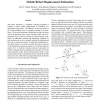Free Online Productivity Tools
i2Speak
i2Symbol
i2OCR
iTex2Img
iWeb2Print
iWeb2Shot
i2Type
iPdf2Split
iPdf2Merge
i2Bopomofo
i2Arabic
i2Style
i2Image
i2PDF
iLatex2Rtf
Sci2ools
109
click to vote
ICRA
2002
IEEE
2002
IEEE
Weighted Range Sensor Matching Algorithms for Mobile Robot Displacement Estimation
This paper introduces a “weighted” matching algorithm to estimate a robot’s planar displacement by matching twodimensional range scans. The influence of each scan point on the overall matching error is weighted according to its uncertainty. We develop uncertainty models that account for effects such as measurement noise, sensor incidence angle, and correspondence error. Based on models of expected sensor uncertainty, our algorithm computes the appropriate weighting for each measurement so as to optimally estimate the displacement between two consecutive poses. By explicitly modeling the various noise sources, we can also calculate the actual covariance of the displacement estimates instead of a statistical approximation of it. A realistic covariance estimate is necessary for further combining the pose displacement estimates with additional odometric and/or inertial measurements within a localization framework [1]. Experiments using a Nomad 200 mobile robot and a Sick LMS-200 la...
Displacement Estimates | ICRA 2002 | Overall Matching Error | Robotics | Robot’s Planar Displacement |
Related Content
| Added | 15 Jul 2010 |
| Updated | 15 Jul 2010 |
| Type | Conference |
| Year | 2002 |
| Where | ICRA |
| Authors | Samuel T. Pfister, Kristopher L. Kriechbaum, Stergios I. Roumeliotis, Joel W. Burdick |
Comments (0)

